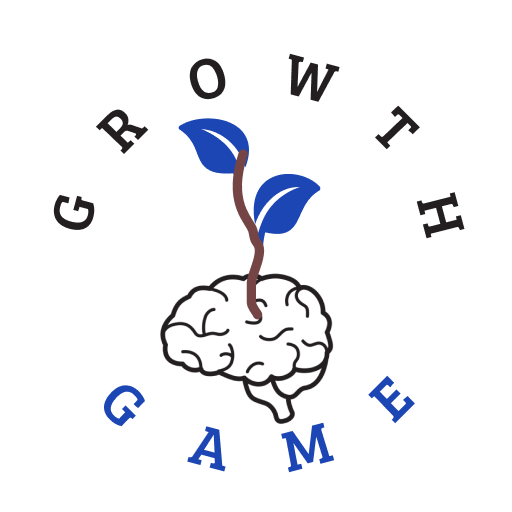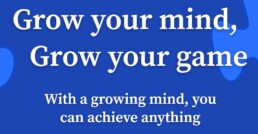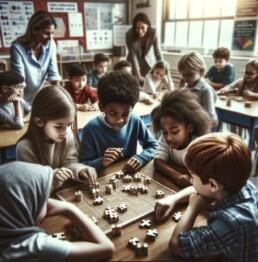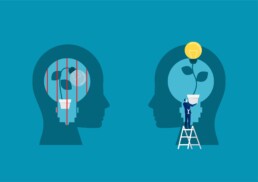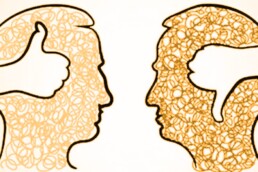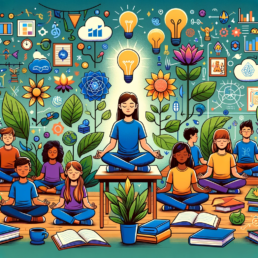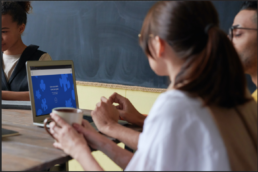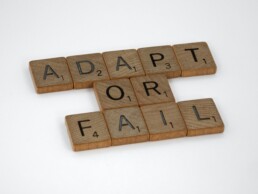The GROWTH Game Web App Official Release
The GROWTH Game has been officially released!
It includes a selection of GROWTH Mindset exercises. It will allow teachers and students to implement them in the classroom with clear directions and learning objectives. The GROWTH Game App allows users to generate sets of exercises based on their preferences and requirements for individual teaching sessions.
Furthermore, users are able to generate handouts for each exercise if necessary, so children can refer to tangible materials in preparation and during play sessions.
The GROWTH Game also includes a self-assessment feature for students, so they can rate their experience in terms of learning satisfaction and difficulty. This allows teachers to 'gauge' the success of each play session and make any necessary adjustments.
The GROWTH Game web-Application, can be accessed here: Growth (8d-games.nl)
Have fun!
Empowering Growth: The Innovative Curriculum Transforming Education
Traditional education often falls short of preparing students for the complexities of real life; the Growth Game curriculum emerges as a beacon of innovation. Designed for children aged 10-14, this curriculum transcends conventional educational frameworks by incorporating interactive challenges that promote a growth mindset. It's not just about the content; it's about fostering resilience, curiosity, and collaboration.
By integrating a unique set of tools and methods, the curriculum empowers students to view challenges as opportunities for growth. Educators are provided with 60 diverse methods and challenges, varying in length, complexity, and participant number, all adaptable to the resources available. This flexibility ensures that the Growth Game can be seamlessly integrated into both formal and informal learning environments.
The essence of the Growth Game lies in its capacity to transform students' attitudes towards learning. It encourages them to embrace failure as a stepping stone to success, fostering an environment where progress is valued over perfection. This innovative approach aims not only to enhance academic journeys but to instill a lifelong love of learning, preparing students to thrive in an ever-changing world.
As we continue to gather results, the transformative impact of the Growth Game on students and educators alike is becoming increasingly evident. It's more than a curriculum; it's a movement towards a future where every challenge is seen as an opportunity for growth and development.
Assessing the effectiveness of Growth Games in the context of fostering development of growth mindset principles among teenagers
Growth game is a set of activities that focuses on the support of developing the growth mindset of teenagers in order to change their self-beliefs and self-reflection about their own personal abilities, competencies and characteristics. Several research has provided important data that supports the beneficial impact of growth mindset intervention in the achievement of academic success.
Since children with growth mindset tend to have a greater level of motivation, tend to pursue challenges, rather than giving up, internalization of growth mindset values may benefit especially underperforming students and thus can contribute to reduce social disparities.
Growth games developed under the Growth Game - Unlocking a well-being power-up Erasmus+ project, based on the growth mindset principles, are aimed to enable teenagers to fulfill their full potential and develop into happy, resilient adults.
Therefore several games were developed in order to help recognise new thinking patterns and thus strengthening teenagers self-beliefs and self-competence in their abilities and potential to grow.
Assessing the rate of change emerged by the growth game gives important feedback to the partners and trainers contributing to the development of the serious games providing information on their effectiveness and thus highlighting possible paths for a better effectiveness.
Several assessment methods and instruments are largely available. Some of them were developed to assess specific aspects of the process of internalizing growth mindset principles. These may vary based on the methodology, tools used, assessment environment etc.
To assess the impact Growth Game intervention, questionnaires and observation were chosen> Questionnaires depict several announcements, statements representing growth mindset principles and teenagers have the option to choose the level they agree with, based on a 4- point Lickert scale. This method of evaluation should give information on the fixed vs growth mindset of teenagers before engaging in the Growth Game.
Idyllically this assessment should be repeated after a certain time-period or set of implemented games giving the opportunity for teenagers to internalize growth mindset values and fostering the recognition of their potential for change, for constant grow of their abilities and competencies, thus inducing change in their self-perception patterns.
Changing mindsets of students, teenagers, developing new assessment and reporting tools to support such change should be included educational agenda as well. A wider appreciation of the ways to provide experiences of success, evaluation focusing on progresses rather than fails could help build healthy mindsets and would certainly support the growth of learners.
The GROWTH GAME User Guide
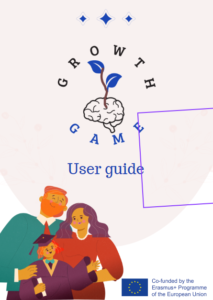
The GROWTH Game User Guide is the key to navigating the different games and activities within Growth Game and unlocking its full potential. Whether you're a player, educator or parents eager to embark on a transformative adventure, this guide will assisting you in implementing the GROWTH Game project results. It will provide you with the insights and strategies needed to make the most of this unique experience.
The User Guide will help you understand how the game works and what the background of the game is. Giving teachers and parents and understanding of the game is key for them to promote their children to take part in it. It shows examples of a few games to teach how it can be used. But the most important part is that it will help you enjoy the game more easily.
The Link between GROWTH Mindset and Mental Health among Adolescents
The concept of a growth mindset revolves around the belief in one's potential for development and adaptability. Embracing a growth mindset, characterized by a belief in flexible attributes, encourages constructive approaches to managing anxiety, frustration, and disappointment, fostering resilience. Individuals with a growth mindset exhibit increased persistence and resilience when confronted with challenges, utilizing effort-oriented strategies to achieve their goals. This mindset is associated with decreased stress levels and self-reported psychological symptoms, providing relief in scenarios such as family stress during adolescence.
In contrast, a fixed mindset, emphasizing entity theories of personality, has been correlated with heightened self-reported stress and anxiety, particularly following ostracism, along with elevated psychosocial stress and psychopathology.
The GROWTH Mindset research among adolescents, suggests that is is closely linked with improved psychological well-being.
The idea of a growth mindset, introduced by Dweck, reflects a fundamental belief that talents can be developed through practice, influencing thoughts and behaviors. Mindset impacts motivation, influencing academic resilience and performance. Both grit and mindset are connected to academic achievement, subjective well-being, and reduced psychopathology. Research suggests that the belief in potential development stimulates long-term learning, persistence, and positive academic outcomes from primary education to higher education.
A growth mindset correlates with improved academic outcomes and reduced stress levels. This mindset is positively linked to learning engagement and negatively correlated with perceived stress during events like the COVID-19 pandemic. Maintaining a growth mindset is particularly advantageous for students from lower-income families, aiding them in overcoming the detrimental effects of poverty on academic achievement.
Additionally, a growth mindset is associated with self-efficacy for health behaviors and perceived control, indicating that individuals with this mindset are more likely to take control of their health.
GROWTH Mindset Best Practices Report
How familiar are students in different European countries with the concept and advantages of a Growth Mindset? - Best Practices Report
In order to find out what exactly are the complicating factors in spreading and teaching growth mindset principles in Europe, the Growth game project consortium carried out desk research on relevant growth mindset interventions applied in partner countries and conducted interviews with children and teenagers aged 10-15, teachers, parents and youth work professionals. The aim of the Best Practices Report is to reveal the current status of growth mindset implementation in the participating countries, the challenges they are facing and to give insight in ways the Growth
Game can be different (and more effective) from existing Growth Mindset interventions.
The target of the research were children and teenagers aged 10-15, caregivers and (foster)parents of children aged 4-18 and teachers and youth workers working with children aged 10-15. The different target groups have been interviewed using different methods: small group discussions, online survey and focus group discussions.
The findings of the project partners’ research is rather different in every participating country.
In Romania, the Growth Mindset is part of the school curriculum for children between 12-13 years, as part of the “Personal and Professional development” compulsory subject. In addition to this, there are a few NGO-s implementing Growth Mindset in their educational programmes.
In the Netherlands, the research showed that approaches to Growth Mindset implementation are mainly focused on teachers so they can use it with their everyday work with school children. Howewer, the principals of Growth Mindset are used in many different learning activities for various age groups both in compulsory and extra cullicular classes, like the KAW (class as a workshop) programme, Kanjertraining (intervention method in primary and secondary education
designed to decrease unpleasant feelings and problem behaviour and to increase well-being and self-esteem).
According to the results of the research of the project partner in Cyprus, it is clearly evident that primary/secondary education in Cyprus has slowly and steadily attempted to move away from ‘traditional’ teaching methods and Growth Mindset practices are indeed implemented in schools and at home with children. There’s an organized, wide-scale implementation of the Growth Mindset related subjects in national schools is the ‘’Social and Emotional Education at School’’ programme in primary education, that focuses on psychosocial support, the development of interpersonal skills, development of resilience and adaptation to the school environment and wider society.
As the Estonian students perform very well in the international tests, it can be concluded that Estonia’s education system is effective and ensures equity. According to their answers, they are satisfied with their school education and their prospects in life. This can be because the Estonian educational system has already integrated the Growth Mindset into their teaching strategy on more educational levels, students of different age groups can participate in learning
programmes as Professional Learning Communities and Schools in motion.
After achieving all this information from the four different countries, Growth Game project partners have concluded that there’s a common need for a tool to teach Growth Mindset in an immersive, gamified way that can be implemented in different kinds of learning situations. They are looking forward to receive feedback from the teachers and students after they have tried out the Serious Game collection the partners have developed.
A Powerful Duo: Feedback and Self-Perception
"I'm not good at this"
When we say things like "I can't" or "I'm not good at this", it's all about how we see ourselves and our attitude toward trying new things, learning, and improving ourselves. But how do we decide if we can or cannot do something? Who told us that? Who taught us that we're not able to?
“Even in the growth mindset, failure can be a painful experience. But it doesn't define you. It's a problem to be faced, dealt with, and learned from.”
Carol Dweck
As humans, we frequently assess the performance of others. We provide feedback on the results and talents of others around us, whether in a classroom, on a sports team, or in the business. However, we may only sometimes be aware of the effect our input has on someone's self-perception.
The self-perception is a mental attitude that starts building when you're a kid and is a complex process influenced by many things. Feedback plays a big role in this process. It helps shape how you see yourself, acting like an inner voice, whether it's critical or supportive.
To better grasp the importance of having mental strength and a resilient mindset when facing challenges, you can check out an interview with a tennis world champion.
Dynamic relationship
The dynamic relationship between feedback and self-evaluation is frequently mentioned in articles about learning and teaching. Recent studies have systematically investigated its meaning. Studies and experiments led by Carol Dweck, the creator of Growth Mindset Theory, provided insights into how feedback influences self-perception among youth.
Research indicates that the way we provide feedback can greatly influence how individuals view themselves.
- For example, if someone receives feedback that focuses solely on their weaknesses, they may begin to see themselves as inadequate or incompetent.
- On the other hand, if someone receives feedback that highlights their strengths and potential, they may feel more confident and motivated to improve.
Constructive feedback serves as a valuable tool in the development of a child's belief system. When delivered in a supportive and nurturing manner, feedback can provide guidance, encouragement, and direction. It helps children understand their strengths and weaknesses, enabling them to become more self-aware individuals. Constructive feedback empowers youth to set realistic goals, learn from their mistakes, and strive for continuous improvement.
How to use your power
Parents, teachers, mentors are playing a big role in shaping what kids believe about themselves. Even peers have an impact—positive feedback boosts confidence, but negative feedback can lead to self-doubt.
While external feedback is undeniably important, it is crucial to strike a balance between external validation and fostering self-belief. Encouraging children to develop a strong sense of self-worth and self-acceptance empowers them to navigate life's challenges with resilience and confidence. By promoting self-reflection, mindfulness, and self-assessment, youth can develop an internal locus of control, enabling them to rely on their judgement and beliefs while considering external feedback as a valuable perspective.
Here are some recommendations for providing constructive feedback:
- Start with positive feedback: Begin by acknowledging the strengths and successes of the individual. This sets a positive tone for the feedback and helps to build confidence.
- Be specific: When providing feedback on areas for improvement, be specific about what the individual can do to improve. Vague feedback such as "do better" or "try harder" is not helpful.
- Offer solutions: Instead of simply pointing out mistakes or weaknesses offer suggestions for how the individual can improve. This shows that you are invested in their success and want to help them grow.
- Focus on effort, not just results: It's important to acknowledge the effort and hard work that an individual puts into a task, even if the results are not perfect. This helps to build resilience and a growth mindset.
By following these recommendations, we can provide feedback that is helpful, fair, and safe for everyone. Whether it's in a classroom setting, on a sports team, or in the workplace, we all have the power to positively impact the self-perception and confidence of those around us. Let's use that power for good.
Article based on:
Ahmavaara, A. M., & Houston, D. M. (2007). The effects of selective schooling and self-concept on adolescents' academic aspiration: An examination of Dweck's self-theory. British Journal of Educational Psychology, 77(3), 613-632. https://bpspsychub.onlinelibrary.wiley.com/doi/10.1348/000709906X120132
Dweck, C. (2008). Mindsets and Math/Science Achievement. New York: Carnegie Corporation of New York, Institute for Advanced Study, Commission on Mathematics and Science Education. http://www.growthmindsetmaths.com/uploads/2/3/7/7/23776169/mindset_and_math_science_achievement_-_nov_2013.pdf
Fong, C.J., Patall, E.A., Vasquez, A.C. et al. A Meta-Analysis of Negative Feedback on Intrinsic Motivation. Educ Psychol Rev 31, 121–162 (2019). https://doi.org/10.1007/s10648-018-9446-6
Jay Shetty Podcast. (2020, September 19). CELEBRITY ATHLETE Reveals The MINDSET You Need To WIN IN LIFE | Novak Djokovic & Jay Shetty. YouTube.
https://www.youtube.com/watch?v=MoAcmJv6_a8
Liu, W. C. (2021, January 11). Implicit theories of Intelligence and achievement goals: A look at students’ intrinsic motivation and achievement in Mathematics. Frontiers. https://www.frontiersin.org/articles/10.3389/fpsyg.2021.593715/full
TED. (2014, December 17). The power of believing that you can improve | Carol Dweck. YouTube. https://www.youtube.com/watch?v=_X0mgOOSpLU
Wood, D. (2000). Self-theories: Their Role in Motivation, Personality and Development. By Carol S. Dweck. Psychology Press, Hove, 1999. pp. 195. The Journal of Child Psychology and Psychiatry and Allied Disciplines, 41(8), 1077-1084.
Harmonizing Growth: The Synergy of Mindfulness and Well-Being in Cultivating a Growth Mindset in Education
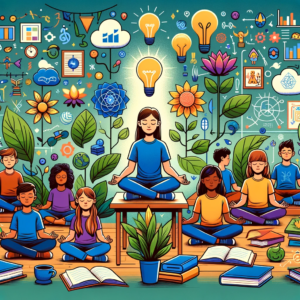
The integration of mindfulness and well-being into educational settings plays a pivotal role in nurturing a growth mindset among children and teenagers. A growth mindset, as defined by psychologist Carol Dweck, is the understanding that abilities and intelligence can be developed through dedication and hard work. This mindset is particularly crucial in educational environments where students are constantly learning and adapting.
Mindfulness in education encourages students to approach learning experiences with a sense of curiosity and openness. It helps them become more aware of their learning processes, thoughts, and emotions, allowing them to engage more deeply with the material and overcome academic challenges. Mindfulness practices in schools, such as focused breathing or guided reflections, can reduce stress and anxiety, fostering a learning environment conducive to growth and exploration.
Well-being is equally important in education. Students who are physically and mentally healthy are more likely to be engaged and motivated learners. Schools that prioritize well-being create supportive environments that encourage students to take risks and learn from their mistakes without fear of judgment. This supportive atmosphere is essential for cultivating a growth mindset, as it empowers students to view challenges as opportunities for development rather than insurmountable obstacles.
The synergy between mindfulness, well-being, and a growth mindset in education is profound. Mindfulness enhances students' emotional regulation and self-awareness, essential skills for adapting to new challenges and persisting through difficulties. Well-being provides the foundational support for students to fully engage in their educational journey. Together, these elements create a holistic approach to learning, where students are not only educated academically but also in terms of their personal and emotional development.
Incorporating mindfulness and well-being into education equips children and teenagers with the tools to develop a growth mindset, an invaluable asset in their academic journey and beyond. It prepares them to face the challenges of the future with resilience, adaptability, and a lifelong love for learning.
Game on ‘Growth Mindset’ for European schools
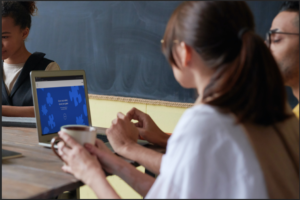
Game on ‘Growth Mindset’ for European schools: progress update!
Within the ‘Growth’ partnership, initiating organisation 8D Games is lead partner for development of the serious game result – an innovative way to promote the growth mindset among primary school students. The game materials, inspired by the theory of renowned psychologist Carol Dweck, are expected to be launched in the spring of 2024. In this article we’ll have a chat with Giel Hekkert - creative director at 8D Games - about the game concept, its theoretical foundation and its potential future usability within the educational field.
Fostering the Growth Mindset in primary education
A crucial element of the growth mindset is the belief that talent and intelligence are not fixed traits but qualities that can be developed through dedication, effort, and an open attitude toward learning. “In 2021, the partnership started off with an inventory of existing growth mindset interventions in primary education in all participating countries,” says Hekkert. “Which methods are effective, and which are not? Also, the partnership explored the current level of familiarity among teachers with the theory behind the growth mindset. The findings of this research are the foundation for the game intervention that is currently in development.”
Hekkert: “After completion of the transnational desk research and field research, we proposed three game concepts: a fully analog game, a hybrid form, and a strongly scenario-oriented digital game. What matters to us is that the implementation of the materials is as accessible as possible, and that teachers endorse the chosen format. This also means that, despite the name suggesting otherwise, a serious game doesn't always have to be entirely digital. In this case, the partnership opted for a hybrid format: growth mindset challenges carried out in the classroom, but accessible and customizable through a web-based generator, making it easy for teachers to put together a suitable and effective lesson package."
Creative Growth Mindset Challenges
The creative challenges that will be accessible through the generator are developed as a collaborative effort of all staff involved in the partnership. “All organisations are rooted in education and/or development of innovative learning methods,” Hekkert notes. "This ensures the assignments are sufficiently diverse, have a solid didactic foundation, and can be applied in various European educational contexts. This is important, as all young citizens can benefit from understanding and internalizing a growth mindset. It is a mindset that will help anyone flourish, not only in school but also in personal and professional life.”
Reusable Framework
The developed technology for the Growth Game provides a solid basis for further development. "The system we've built is well-suited for the adaptive delivery of various teaching materials, even on different subjects. We will certainly explore how the framework developed within this project can be useful for other educational objectives – especially within a European context, as we have already considered multilingualism. We are always open to new collaborations in this area."
The Growth Game and its accompanying materials will be published (and freely accessible) through this website. For more information on serious gaming or gamification of educational materials, one can reach out to info@8d-games.nl.
This project is co-funded by the European Union under the Erasmus+ Partnerships program.
The Power of Growth Mindset: Cultivating Resilience in Children for a Successful Adulthood
The ability to adapt, learn, and persevere is a crucial one for all people, and developing it starts from an early age. While intelligence and talent are often celebrated, it's the resilience and determination that often determine one's success. This is where the concept of a "growth mindset" comes into play. Developed by psychologist Dr. Carol Dweck, the growth mindset is the belief that abilities and intelligence can be developed through dedication and hard work. This perspective contrasts with a "fixed mindset," where individuals believe their talents and abilities are static. But how does a growth mindset influence a child's resilience, and how can it pave the way for a successful adulthood?
- Embracing Challenges and Learning from Failure
Children with a growth mindset see challenges as opportunities to learn and grow. Instead of avoiding difficulties, they embrace them, knowing that they offer a chance to improve. When they encounter setbacks, they don't view them as insurmountable barriers but as stepping stones to success. This approach fosters resilience, as children learn that failure isn't the end but a part of the learning journey. By internalizing this belief, they're better equipped to face the inevitable challenges of adulthood.
- The Power of "Yet"
One of the most transformative words in the growth mindset vocabulary is "yet." A child might say, "I can't solve this math problem," but with a growth mindset, the statement becomes, "I can't solve this math problem yet." This simple addition transforms a statement of defeat into one of hope and potential. It teaches children that with time, effort, and the right strategies, they can overcome obstacles. This belief in potential and the future instills a sense of resilience that will serve them well in their adult lives.
- Valuing the Process Over the Outcome
A growth mindset shifts the focus from the end result to the journey. Children learn to value the process of learning, the effort they put in, and the strategies they employ. This perspective reduces the fear of failure, as the emphasis is not on always getting the right answer but on the learning that happens along the way. By appreciating the journey, children develop a resilience that helps them navigate the ups and downs of life, ensuring they're not easily discouraged when things don't go as planned.
- Cultivating a Love for Learning
Children with a growth mindset develop a genuine love for learning. They're curious, eager to explore new concepts, and open to feedback. This passion for knowledge doesn't wane as they grow older. Instead, it becomes a driving force, pushing them to continuously seek opportunities to learn and grow. As adults, this love for learning can translate into career advancements, personal development, and a richer, more fulfilling life.
- Building Stronger Relationships
A growth mindset doesn't just impact academic or professional success; it also influences interpersonal relationships. Children who believe in growth understand that people can change and evolve. They're more likely to be forgiving, understanding, and open to feedback, qualities that are essential for building strong, lasting relationships in adulthood.
Cultivating a growth mindset in children is one of the most valuable gifts we can offer. It not only equips them with the resilience to face challenges head-on but also instills a lifelong love for learning, a belief in their potential, and the tools to build meaningful relationships. As these children transition into adulthood, they carry with them a mindset that not only ensures success in their endeavors but also enriches their lives in countless ways.
